Gairdner J. History of the Life and Reign of Richard the Third: To which is Added the Story of Perkin Warbeck from Original Documents
Подождите немного. Документ загружается.

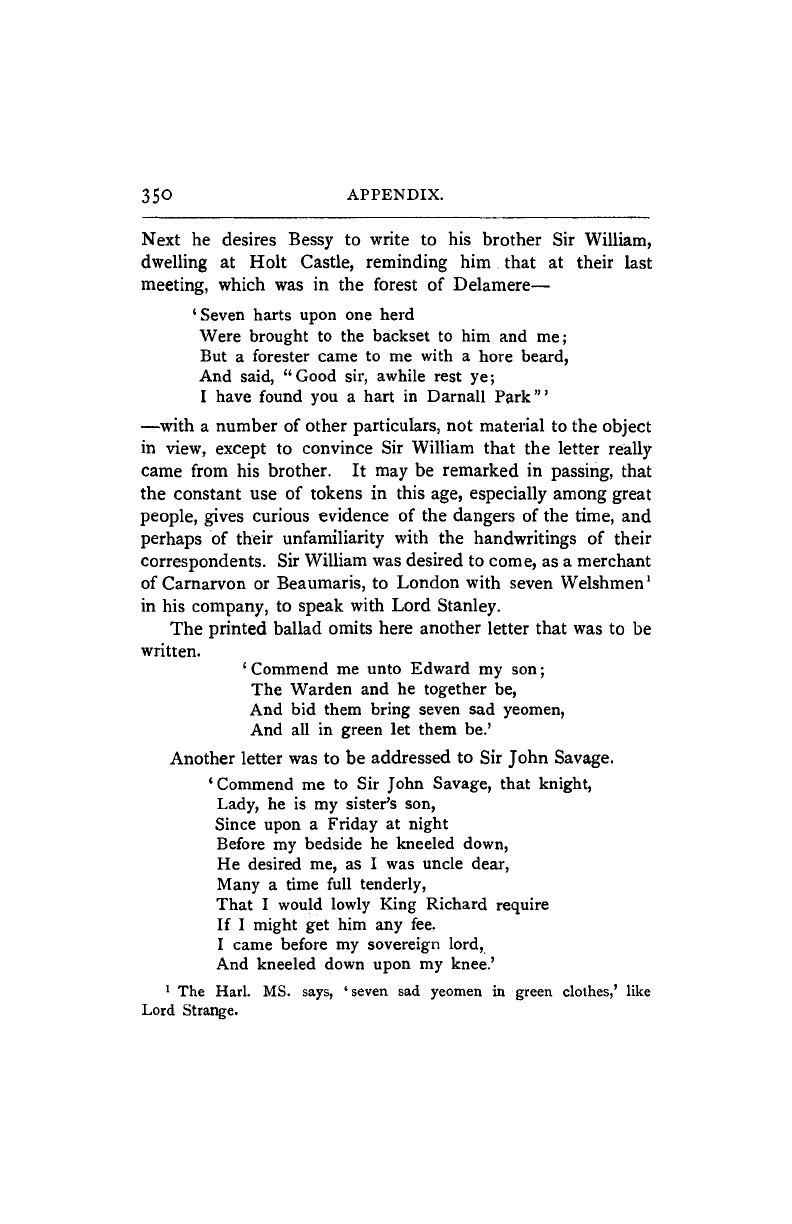
3SO APPENDIX.
Next he desires Bessy to write to his brother Sir William,
dwelling at Holt Castle, reminding him that at their last
meeting, which was in the forest of Delamere—
'Seven harts upon one herd
Were brought to the backset to him and me;
But a forester came to me with a hore beard,
And said, "Good sir, awhile rest ye;
I have found you a hart in Darnall Park"'
—with a number of other particulars, not material to the object
in view, except to convince Sir William that the letter really
came from his brother. It may be remarked in passing, that
the constant use of tokens in this age, especially among great
people, gives curious evidence of the dangers of the time, and
perhaps of their unfamiliarity with the handwritings of their
correspondents. Sir William was desired to come, as a merchant
of Carnarvon or Beaumaris, to London with seven Welshmen'
in his company, to speak with Lord Stanley.
The printed ballad omits here another letter that was to be
written.
'
Commend me unto Edward my son;
The Warden and he together be,
And bid them bring seven sad yeomen,
And all in green let them be.'
Another letter was to be addressed to Sir John Savage.
'Commend me to Sir John Savage, that knight,
Lady, he is my sister's son,
Since upon a Friday at night
Before my bedside he kneeled down,
He desired me, as I was uncle dear,
Many a time full tenderly,
That I would lowly King Richard require
If I might get him any fee.
I came before my sovereign lord,
And kneeled down upon my knee.'
1
The Harl. MS. says, ' seven sad yeomen in green clothes,' like
Lord Strange.
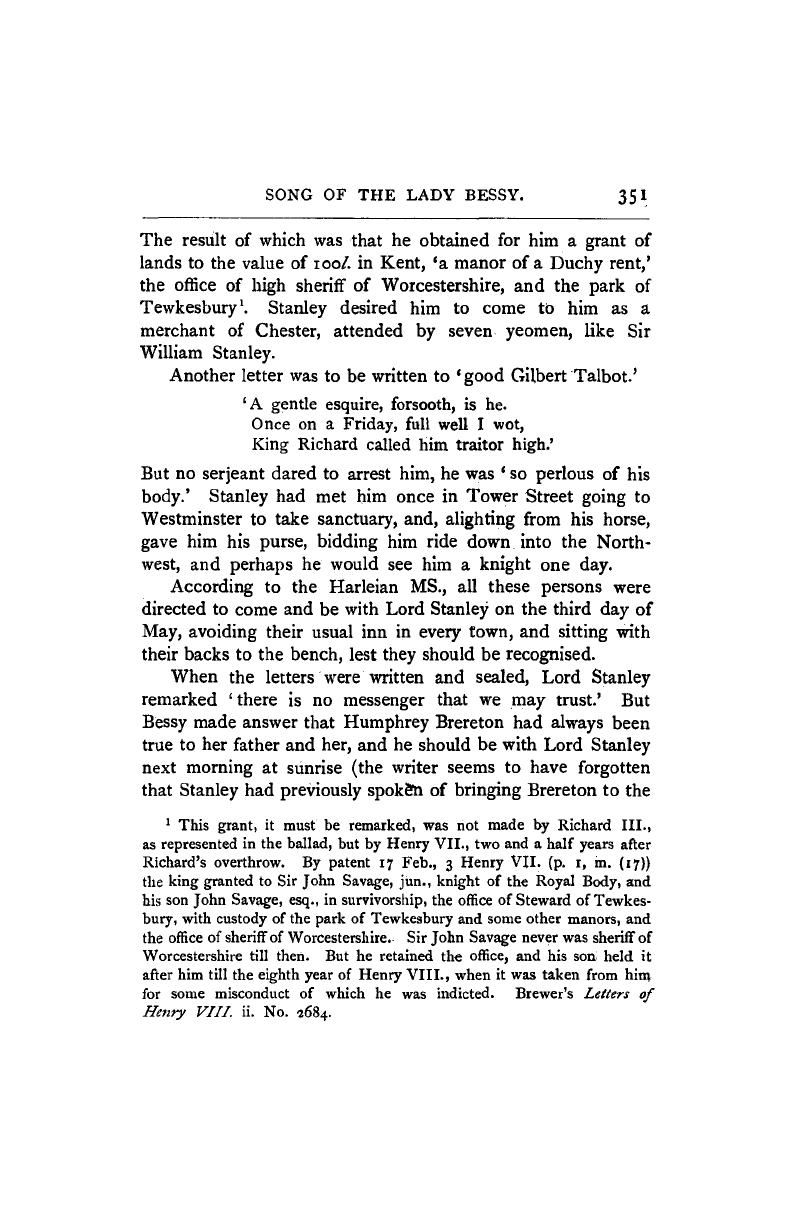
SONG OF THE LADY BESSY. 351
The result of which was that he obtained for him a grant of
lands to the value of 100/. in Kent,
{
a manor of a Duchy rent,'
the office of high sheriff of Worcestershire, and the park of
Tewkesbury
1
. Stanley desired him to come to him as a
merchant of Chester, attended by seven yeomen, like Sir
William Stanley.
Another letter was to be written to ' good Gilbert Talbot.'
'A gentle esquire, forsooth, is he.
Once on a Friday, full well I wot,
King Richard called him traitor high.'
But no serjeant dared to arrest him, he was ' so perlous of his
body.' Stanley had met him once in Tower Street going to
Westminster to take sanctuary, and, alighting from his horse,
gave him his purse, bidding him ride down into the North-
west, and perhaps he would see him a knight one day.
According to the Harleian MS., all these persons were
directed to come and be with Lord Stanley on the third day of
May, avoiding their usual inn in every town, and sitting with
their backs to the bench, lest they should be recognised.
When the letters were written and sealed, Lord Stanley
remarked 'there is no messenger that we may trust.' But
Bessy made answer that Humphrey Brereton had always been
true to her father and her, and he should be with Lord Stanley
next morning at sunrise (the writer seems to have forgotten
that Stanley had previously spok&n of bringing Brereton to the
1
This grant, it must be remarked, was not made by Richard III.,
as represented in the ballad, but by Henry VII., two and a half years after
Richard's overthrow. By patent 17 Feb., 3 Henry VII. (p. 1, m. (17))
the king granted to Sir John Savage, jun., knight of the Royal Body, and
his son John Savage, esq., in survivorship, the office of Steward of Tewkes-
bury, with custody of the park of Tewkesbury and some other manors, and
the office of sheriff of Worcestershire. Sir John Savage never was sheriff of
Worcestershire till then. But he retained the office, and his son held it
after him till the eighth year of Henry VIII., when it was taken from him
for some misconduct of which he was indicted. Brewer's Letters of
Henry
VIII.
ii. No. •2684.
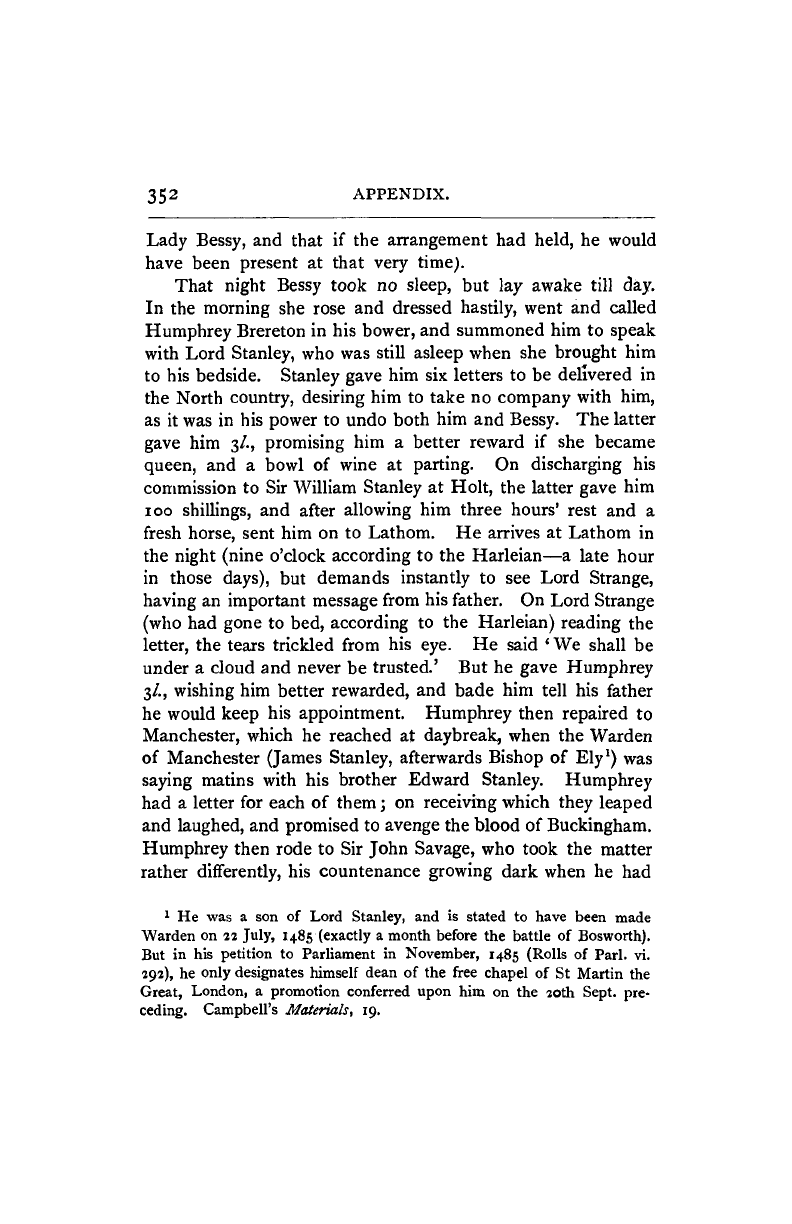
352 APPENDIX.
Lady Bessy, and that if the arrangement had held, he would
have been present at that very time).
That night Bessy took no sleep, but lay awake till day.
In the morning she rose and dressed hastily, went and called
Humphrey Brereton in his bower, and summoned him to speak
with Lord Stanley, who was still asleep when she brought him
to his bedside. Stanley gave him six letters to be delivered in
the North country, desiring him to take no company with him,
as it was in his power to undo both him and Bessy. The latter
gave him 3/., promising him a better reward if she became
queen, and a bowl of wine at parting. On discharging his
commission to Sir William Stanley at Holt, the latter gave him
100 shillings, and after allowing him three hours' rest and a
fresh horse, sent him on to Lathom. He arrives at Lathom in
the night (nine o'clock according to the Harleian—a late hour
in those days), but demands instantly to see Lord Strange,
having an important message from his father. On Lord Strange
(who had gone to bed, according to the Harleian) reading the
letter, the tears trickled from his eye. He said ' We shall be
under a cloud and never be trusted.' But he gave Humphrey
3/.,
wishing him better rewarded, and bade him tell his father
he would keep his appointment. Humphrey then repaired to
Manchester, which he reached at daybreak, when the Warden
of Manchester (James Stanley, afterwards Bishop of Ely
1
) was
saying matins with his brother Edward Stanley. Humphrey
had a letter for each of them; on receiving which they leaped
and laughed, and promised to avenge the blood of Buckingham.
Humphrey then rode to Sir John Savage, who took the matter
rather differently, his countenance growing dark when he had
1
He was a son of Lord Stanley, and is stated to have been made
Warden on 22 July, 1485 (exactly a month before the battle of Bosworth).
But in his petition to Parliament in November, 1485 (Rolls of Parl. vi.
192),
he only designates himself dean of the free chapel of St Martin the
Great, London, a promotion conferred upon him on the 20th Sept. pre-
ceding. Campbell's Materials, 19.
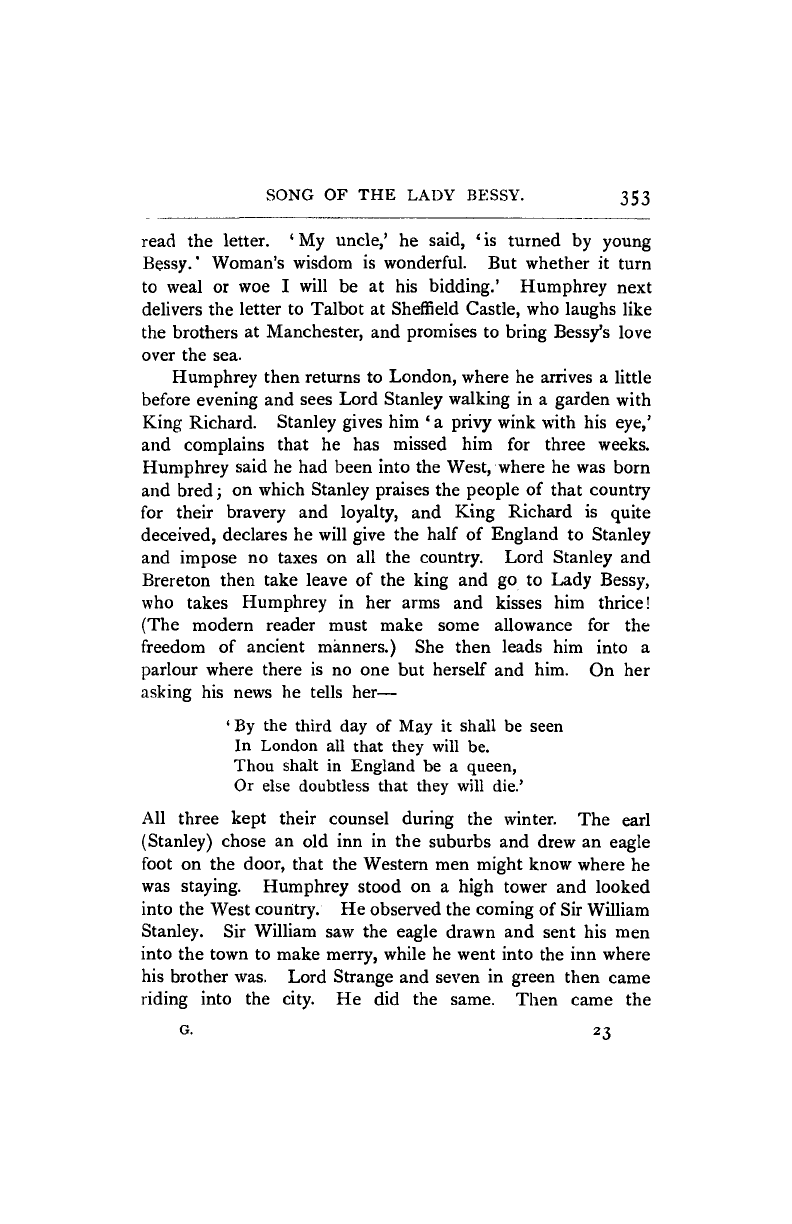
SONG OF THE LADY BESSY. 353
read the letter. ' My uncle,' he said, '
is
turned by young
Bessy." Woman's wisdom is wonderful. But whether it turn
to weal or woe I will be at his bidding.' Humphrey next
delivers the letter to Talbot at Sheffield Castle, who laughs like
the brothers at Manchester, and promises to bring Bessy's love
over the sea.
Humphrey then returns to London, where he arrives a little
before evening and sees Lord Stanley walking in a garden with
King Richard. Stanley gives him ' a privy wink with his eye,'
and complains that he has missed him for three weeks.
Humphrey said he had been into the West, where he was born
and bred; on which Stanley praises the people of that country
for their bravery and loyalty, and King Richard is quite
deceived, declares he will give the half of England to Stanley
and impose no taxes on all the country. Lord Stanley and
Brereton then take leave of the king and go to Lady Bessy,
who takes Humphrey in her arms and kisses him thrice!
(The modern reader must make some allowance for the
freedom of ancient manners.) She then leads him into a
parlour where there is no one but herself and him. On her
asking his news he tells her—
'By the third day of May it shall be seen
In London all that they will be.
Thou shalt in England be a queen,
Or else doubtless that they will die.'
All three kept their counsel during the winter. The earl
(Stanley) chose an old inn in the suburbs and drew an eagle
foot on the door, that the Western men might know where he
was staying. Humphrey stood on a high tower and looked
into the West country. He observed the coming of Sir William
Stanley. Sir William saw the eagle drawn and sent his men
into the town to make merry, while he went into the inn where
his brother was. Lord Strange and seven in green then came
riding into the city. He did the same. Then came the
G.
23
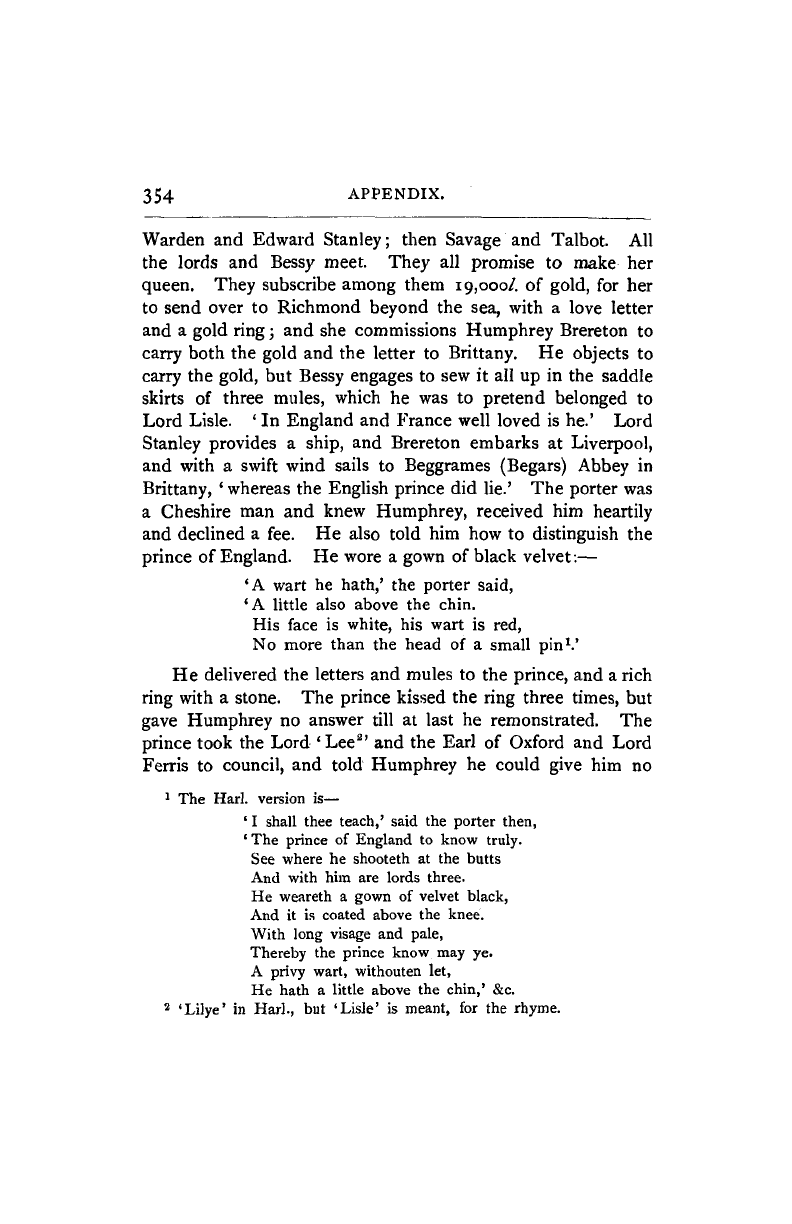
354 APPENDIX.
Warden and Edward Stanley; then Savage and Talbot. All
the lords and Bessy meet. They all promise to make her
queen. They subscribe among them 19,000/. of gold, for her
to send over to Richmond beyond the sea, with a love letter
and a gold ring; and she commissions Humphrey Brereton to
carry both the gold and the letter to Brittany. He objects to
carry the gold, but Bessy engages to sew it all up in the saddle
skirts of three mules, which he was to pretend belonged to
Lord Lisle. ' In England and France well loved is he.' Lord
Stanley provides a ship, and Brereton embarks at Liverpool,
and with a swift wind sails to Beggrames (Begars) Abbey in
Brittany, ' whereas the English prince did lie.' The porter was
a Cheshire man and knew Humphrey, received him heartily
and declined a fee. He also told him how to distinguish the
prince of England. He wore a gown of black velvet:—
'A wart he hath,' the porter said,
'A little also above the chin.
His face is white, his wart is red,
No more than the head of a small pin
1
.'
He delivered the letters and mules to the prince, and a rich
ring with a stone. The prince kissed the ring three times, but
gave Humphrey no answer till at last he remonstrated. The
prince took the Lord ' Lee
2
' and the Earl of Oxford and Lord
Ferris to council, and told Humphrey he could give him no
1
The Harl. version is—
' I shall thee teach,' said the porter then,
' The prince of England to know truly.
See where he shooteth at the butts
And with him are lords three.
He weareth a gown of velvet black,
And it is coated above the knee.
With long visage and pale,
Thereby the prince know may ye.
A privy wart, withouten let,
He hath a little above the chin,' &c.
2
'Lilye' in Harl., but 'Lisle' is meant, for the rhyme.
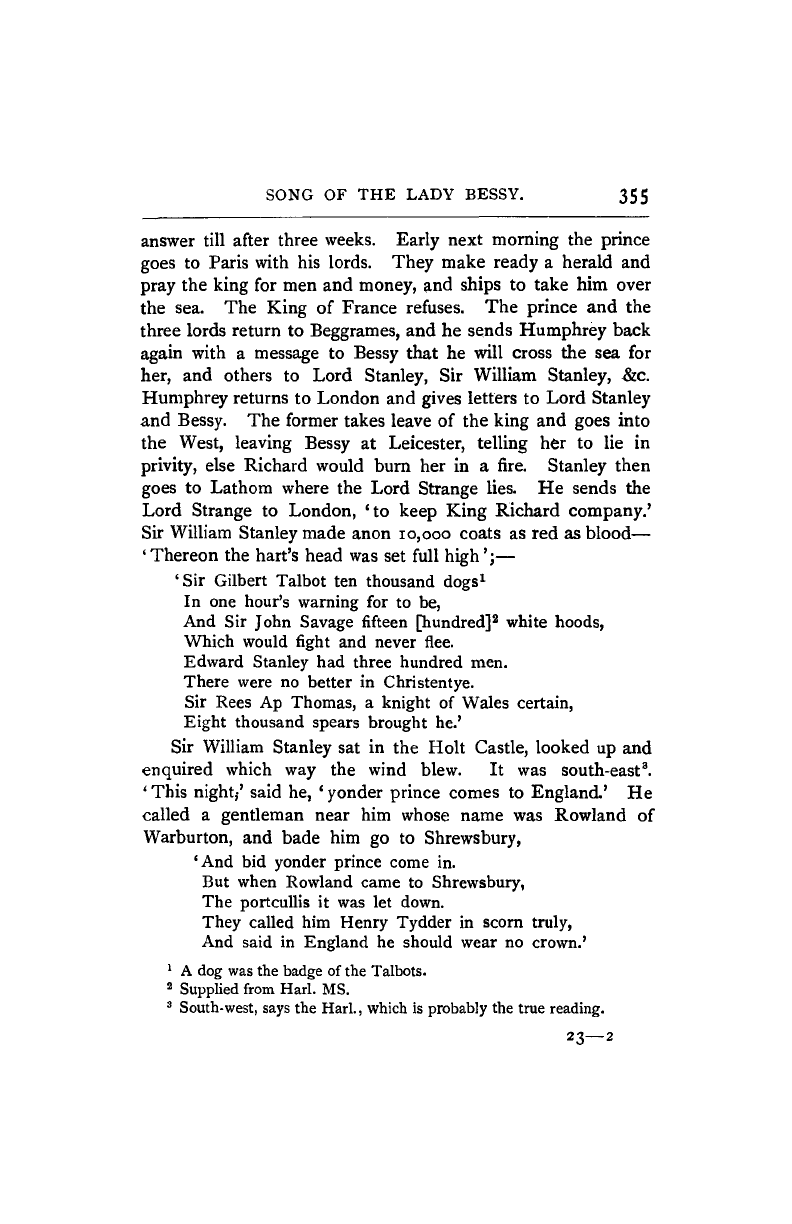
SONG OF THE LADY BESSY. 355
answer till after three weeks. Early next morning the prince
goes to Paris with his lords. They make ready a herald and
pray the king for men and money, and ships to take him over
the sea. The King of France refuses. The prince and the
three lords return to Beggrames, and he sends Humphrey back
again with a message to Bessy that he will cross the sea for
her, and others to Lord Stanley, Sir William Stanley, &c.
Humphrey returns to London and gives letters to Lord Stanley
and Bessy. The former takes leave of the king and goes into
the West, leaving Bessy at Leicester, telling her to lie in
privity, else Richard would burn her in a fire. Stanley then
goes to Lathom where the Lord Strange lies. He sends the
Lord Strange to London, 'to keep King Richard company.'
Sir William Stanley made anon 10,000 coats as red as blood—
' Thereon the hart's head was set full high';—
'Sir Gilbert Talbot ten thousand dogs
1
In one hour's warning for to be,
And Sir John Savage fifteen [hundred]
2
white hoods,
Which would fight and never flee.
Edward Stanley had three hundred men.
There were no better in Christentye.
Sir Rees Ap Thomas, a knight of Wales certain,
Eight thousand spears brought he.'
Sir William Stanley sat in the Holt Castle, looked up and
enquired which way the wind blew. It was south-east
3
.
' This night,-' said he, ' yonder prince comes to England.' He
called a gentleman near him whose name was Rowland of
Warburton, and bade him go to Shrewsbury,
'And bid yonder prince come in.
But when Rowland came to Shrewsbury,
The portcullis it was let down.
They called him Henry Tydder in scorn truly,
And said in England he should wear no crown.'
1
A dog was the badge of the Talbots.
2
Supplied from Harl. MS.
3
South-west, says the Harl., which is probably the true reading.
23—2
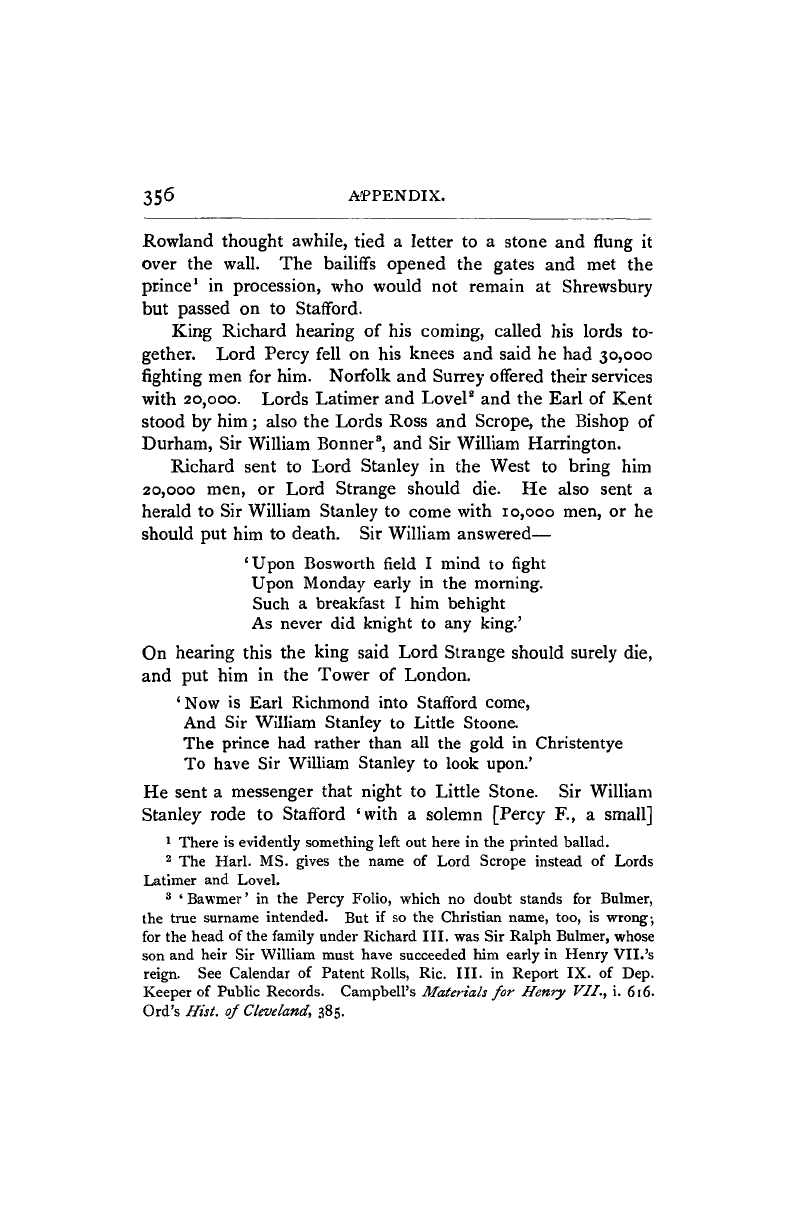
356 A'PPENDIX.
Rowland thought awhile, tied a letter to a stone and flung it
over the wall. The bailiffs opened the gates and met the
prince
1
in procession, who would not remain at Shrewsbury
but passed on to Stafford.
King Richard hearing of his coming, called his lords to-
gether. Lord Percy fell on his knees and said he had 30,000
fighting men for him. Norfolk and Surrey offered their services
with 20,000. Lords Latimer and Lovel
2
and the Earl of Kent
stood by him; also the Lords Ross and Scrope, the Bishop of
Durham, Sir William Bonner
3
, and Sir William Harrington.
Richard sent to Lord Stanley in the West to bring him
20,000 men, or Lord Strange should die. He also sent a
herald to Sir William Stanley to come with 10,000 men, or he
should put him to death. Sir William answered—
'Upon Bosworth field I mind to fight
Upon Monday early in the morning.
Such a breakfast I him behight
As never did knight to any king.'
On hearing this the king said Lord Strange should surely die,
and put him in the Tower of London.
' Now is Earl Richmond into Stafford come,
And Sir William Stanley to Little Stoone.
The prince had rather than all the gold in Christentye
To have Sir William Stanley to look upon.'
He sent a messenger that night to Little Stone. Sir William
Stanley rode to Stafford 'with a solemn [Percy R, a small]
1
There is evidently something left out here in the printed ballad.
2
The Harl. MS. gives the name of Lord Scrope instead of Lords
Latimer and Lovel.
3
'Bawmer' in the Percy Folio, which no doubt stands for Buhner,
the true surname intended. But if so the Christian name, too, is wrong;
for the head of the family under Richard III. was Sir Ralph Bulmer, whose
son and heir Sir William must have succeeded him early in Henry VII.'s
reign. See Calendar of Patent Rolls, Ric. III. in Report IX. of Dep.
Keeper of Public Records. Campbell's
Materials
for Henry VII., i. 616.
Ord's Hist, of Cleveland, 385.
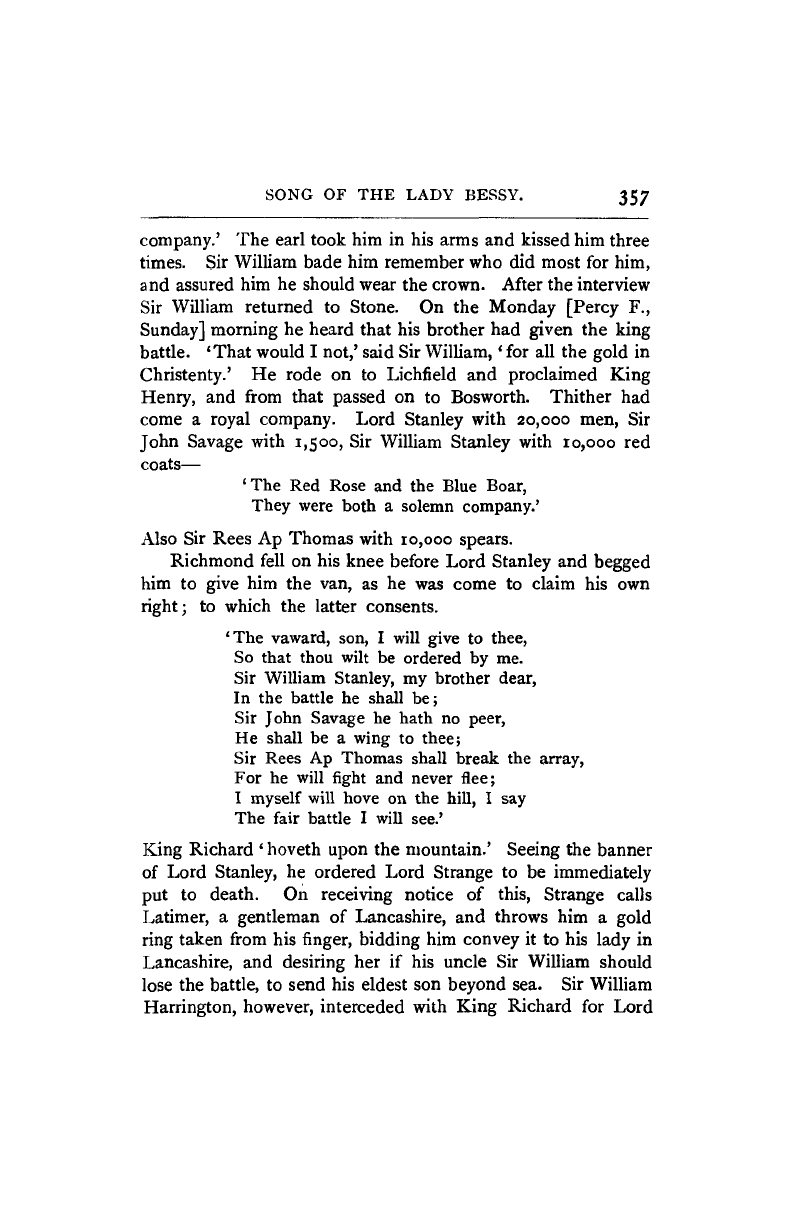
SONG OF THE LADY BESSY. 357
company.' The earl took him in his arms and kissed him three
times.
Sir William bade him remember who did most for him,
and assured him he should wear the crown. After the interview
Sir William returned to Stone. On the Monday [Percy F.,
Sunday] morning he heard that his brother had given the king
battle. 'That would I not,' said Sir William,' for all the gold in
Christenty.' He rode on to Lichfield and proclaimed King
Henry, and from that passed on to Bosworth. Thither had
come a royal company. Lord Stanley with 20,000 men, Sir
John Savage with
1,500,
Sir William Stanley with 10,000 red
coats—
'The Red Rose and the Blue Boar,
They were both a solemn company.'
Also Sir Rees Ap Thomas with 10,000 spears.
Richmond fell on his knee before Lord Stanley and begged
him to give him the van, as he was come to claim his own
right; to which the latter consents.
'The vaward, son, I will give to thee,
So that thou wilt be ordered by me.
Sir William Stanley, my brother dear,
In the battle he shall be;
Sir John Savage he hath no peer,
He shall be a wing to thee;
Sir Rees Ap Thomas shall break the array,
For he will fight and never flee;
I myself will hove on the hill, I say
The fair battle I will see.'
King Richard ' hoveth upon the mountain.' Seeing the banner
of Lord Stanley, he ordered Lord Strange to be immediately
put to death. On receiving notice of this, Strange calls
Latimer, a gentleman of Lancashire, and throws him a gold
ring taken from his finger, bidding him convey it to his lady in
Lancashire, and desiring her if his uncle Sir William should
lose the battle, to send his eldest son beyond sea. Sir William
Harrington, however, interceded with King Richard for Lord
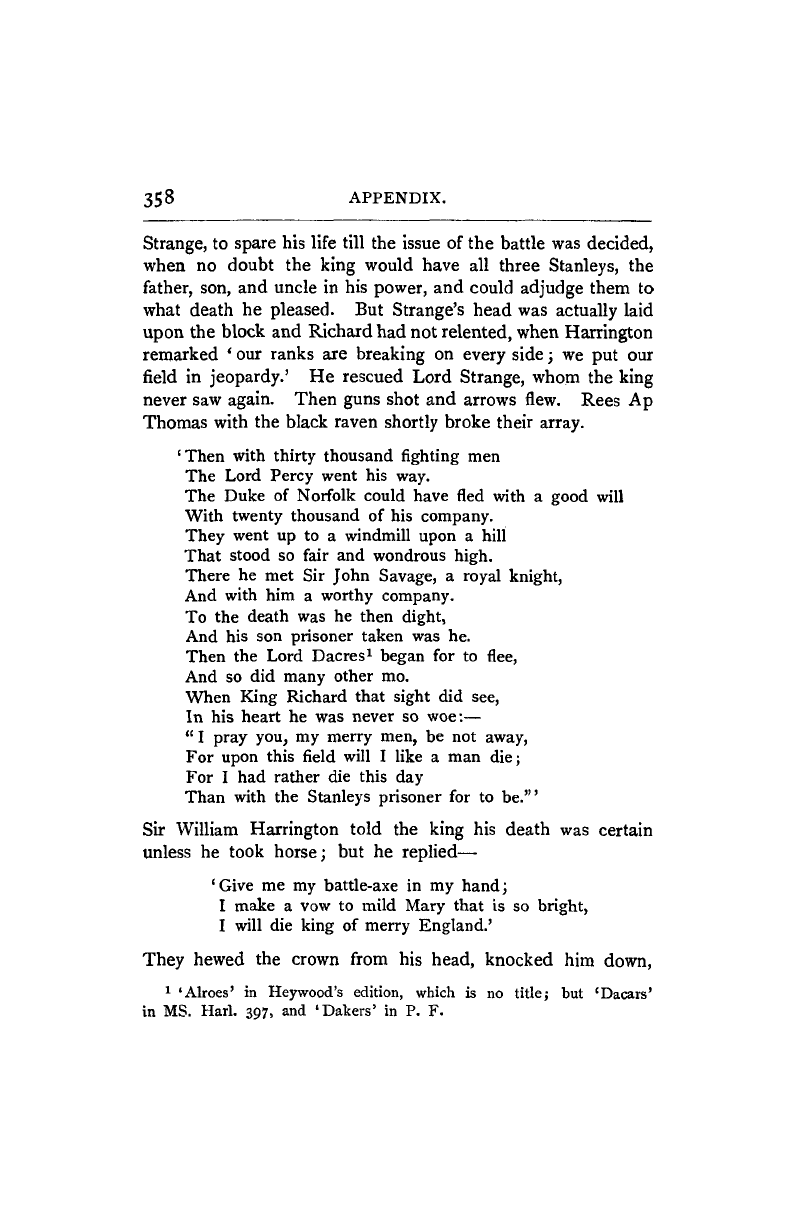
358 APPENDIX.
Strange, to spare his life till the issue of the battle was decided,
when no doubt the king would have all three Stanleys, the
father, son, and uncle in his power, and could adjudge them to
what death he pleased. But Strange's head was actually laid
upon the block and Richard had not relented, when Harrington
remarked ' our ranks are breaking on every side; we put our
field in jeopardy.' He rescued Lord Strange, whom the king
never saw again. Then guns shot and arrows flew. Rees Ap
Thomas with the black raven shortly broke their array.
'Then with thirty thousand fighting men
The Lord Percy went his way.
The Duke of Norfolk could have fled with a good will
With twenty thousand of his company.
They went up to a windmill upon a hill
That stood so fair and wondrous high.
There he met Sir John Savage, a royal knight,
And with him a worthy company.
To the death was he then dight,
And his son prisoner taken was he.
Then the Lord Dacres
1
began for to flee,
And so did many other mo.
When King Richard that sight did see,
In his heart he was never so woe:—
" I pray you, my merry men, be not away,
For upon this field will I like a man die;
For I had rather die this day
Than with the Stanleys prisoner for to be.'"
Sir William Harrington told the king his death was certain
unless he took horse; but he replied—-
' Give me my battle-axe in my hand;
I make a vow to mild Mary that is so bright,
I will die king of merry England.'
They hewed the crown from his head, knocked him down,
1
'Alroes' in Heywood's edition, which is no title; but 'Dacars'
in MS. Harl. 397, and 'Dakers' in P. F.
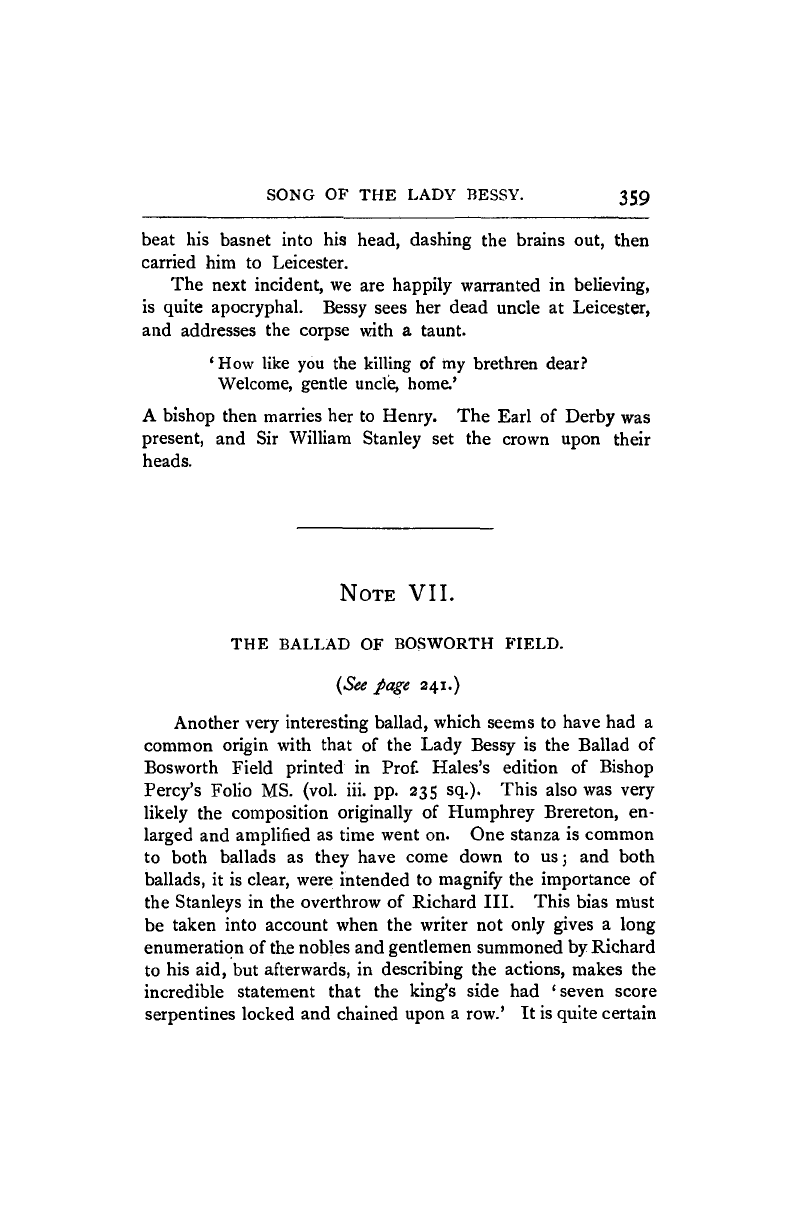
SONG OF THE LADY BESSY. 359
beat his basnet into his head, dashing the brains out, then
carried him to Leicester.
The next incident, we are happily warranted in believing,
is quite apocryphal. Bessy sees her dead uncle at Leicester,
and addresses the corpse with a taunt.
' How like you the killing of rny brethren dear?
Welcome, gentle uncle, home.'
A bishop then marries her to Henry. The Earl of Derby was
present, and Sir William Stanley set the crown upon their
heads.
NOTE
VII.
THE BALLAD OF BOSWORTH FIELD.
(See page 241.)
Another very interesting ballad, which seems to have had a
common origin with that of the Lady Bessy is the Ballad of
Bosworth Field printed in
Prof.
Hales's edition of Bishop
Percy's Folio MS. (vol. iii. pp. 235 sq.). This also was very
likely the composition originally of Humphrey Brereton, en-
larged and amplified as time went on. One stanza is common
to both ballads as they have come down to us; and both
ballads, it is clear, were intended to magnify the importance of
the Stanleys in the overthrow of Richard III. This bias must
be taken into account when the writer not only gives a long
enumeration of the nobles and gentlemen summoned by Richard
to his aid, but afterwards, in describing the actions, makes the
incredible statement that the king's side had 'seven score
serpentines locked and chained upon a row.' It is quite certain
